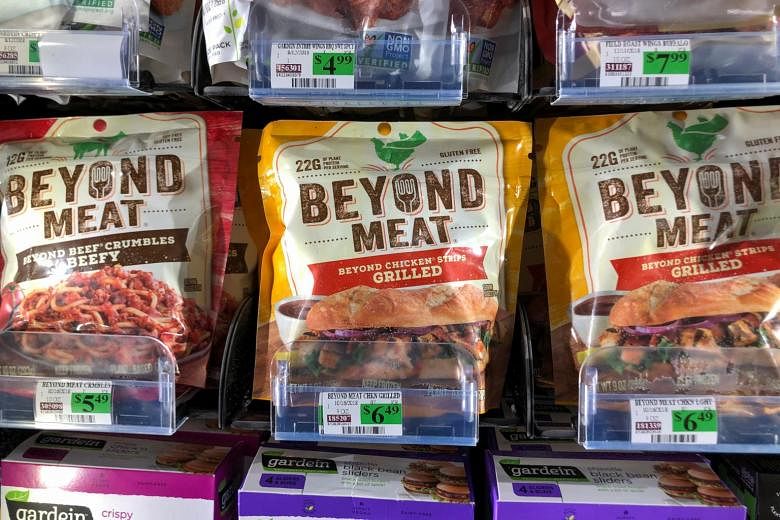NEW YORK (BLOOMBERG) - All it took was a rosy sales outlook to send Beyond Meat Inc. soaring - again.
The faux meat-maker's shares had already quadrupled since its May 1 initial public offering before jumping as much as 26 per cent in late trading on Thursday (June 6), after its first quarterly report came out. What captured investors' attention was the forecast that sales would exceed US$210 million (S$286.5 million) this year, beating analysts' estimate for about US$205 million.
To put that into perspective, revenue last year was all of US$88 million.
This kind of wild success out of the gate - reminiscent of the marijuana industry and some of its stratospheric valuations - illustrates Wall Street's hunger for markets that aren't yet completely mapped out. The excitement here is about the clear increase in demand for foods that resemble meat but aren't made out of it. The California-based company is benefiting from being one of the first producers on the scene.
And of course it now faces the challenge of backing up the optimistic projections, as the competition builds.
Vito Racanelli of Fundstrat Global Advisors predicted the stock would be volatile but said he wouldn't recommend taking a short position -- betting that its value will decline.
"It remains to be seen how long BYND can keep this growth of over 200 per cent, though likely it will remain strong for some time," he said in an email, referring to the company by its ticker on the Nasdaq Global Market.
Sales are growing as people seek to cut down on meat for health and environmental reasons. The market for meat alternatives could reach approximately US$140 billion and take 10 per cent of the US$1.4 trillion meat market, according to research from Barclays.
Executives hinted that there could be a big customer announcement coming soon, and said the second and third quarters - grilling season - would be the strongest of the year.
"We're being very conservative," chief executive officer Ethan Brown said in a call with analysts.
Brown added that the company is "still in the very early innings of growth" and that it had learned from product shortages in 2017 and 2018. He said Beyond Meat now has the capacity to take on the big ticket of a large, national fast-food client.
But it may take a while for actual profits to materialize. The company reported a net loss US$6.6 million, wider than the loss of US$5.7 million a year earlier. Losses could continue to be in the picture as Beyond Meat expands distribution, invests in infrastructure and creates new products.
And there are other headwinds. The company's main rival, Impossible Foods, recently announced a roll-out with Burger King. What's more, food giants like Tyson Foods and Nestle are working on competing products.
Maybe there will be enough demand for all of them. Americans in Gen Z - an age group that ranges roughly from 7 to 22 - are more than twice as likely to classify themselves as vegetarians, vegans or pescatarians than their Gen X or Boomer parents, according to a survey by Bloomberg News and Morning Consult.
Even many of those not cutting meat out entirely are trying to eat less of it, with 26 per cent of Gen Zers saying they're making the effort, more than the nationwide average of 19 per cent, according to market research company Mintel.
Investors buying the stock are taking the view that "meatless products will indeed grow sharply in attractiveness to consumers in the future," Racanelli said, and that Beyond Meat "has a lasting first-mover advantage."

